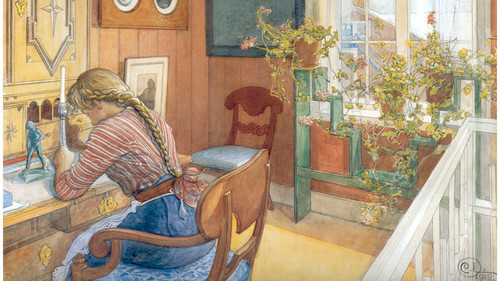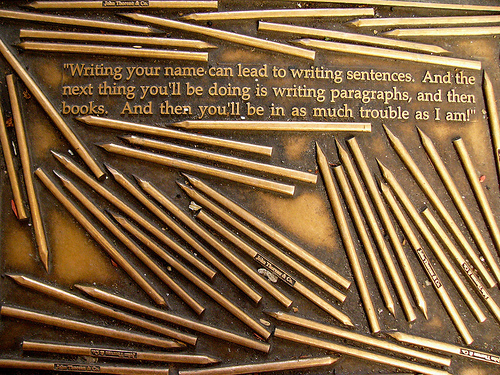Ah, the dreaded cliché! The worst feedback a writer can get is, "Well, it sounds sort of cliché, doesn't it?"
All authors want to be original. If someone even mentions that a writer's work reminds them of someone else's, the writer tenses up. "No, no, no, I'm nothing like him," he says swiftly. "I've never even read him."
"Yeah, but it's kinda like him," the reader persists, believing she is giving a compliment rather than an insult. "He's incredible, bạn should read him!"
The thing is-- it should be a compliment when a reader compares your work to a published writer. We all have our influences. It is important to know that there is no new idea. If you've considered something, odds are there was someone before bạn who considered that very same idea. It doesn't make bạn unoriginal hoặc a copy-cat. It just makes bạn human.
bạn as an individual are very unique. Our experiences, family, friends, and personality combine to make a fingerprint that no other can replicate exactly. And even if bạn came up with the idea of a scientist and his alter-ego without ever even hearing of Robert Louis Stevenson, bạn can still write that story and add your own personal perspective on it. T.S. Eliot once đã đưa ý kiến that "Mediocre Writers Borrow; Great Writers Steal."
And who do we consider to be great writers? Shakespeare. Steinbeck. Dante. Poe. Do bạn really believe their ideas were completely their own? Shakespeare, for example, wrote numerous plays with creative plots that he borrowed either from history hoặc from stories much older than he was. Romeo and Juliet was a retelling of the old Roman Romance, Pyramus and Thisbe, with smatterings of history. He does not try to hide the roots of his plays. In fact, he often celebrates them. In A Midsummer Night's Dream for example, the Mechanicals parody this tale bởi putting on a poor performance of it. If bạn think that it ends with that, Twelfth Night is based on an old Italian story, Gl’ Ingannati. Othello's tale comes from Cinthio's Desdemona.
If Shakespeare's nghề viết văn was not original, why is he celebrated? For the way he tells these classic tales and makes them his own. His language, his characters, and the way he strings together history and fiction into beautiful pieces of theater. To say nothing of Steinbeck and Dante who used the Bible thêm often than once, hoặc Poe who used classic poetic patterns to make his prose thêm interesting. Every good writer steals from one another.
This includes what we call the "cliché." All a cliché is, in the end, is an old idea. Now bạn have two choices when it comes to clichés: embrace them hoặc reject them. Do not dilly-dally between the two. Because if bạn write something and believe it's a cliché, and bạn didn't want it to be a cliché but bạn leave it as it is, it will come off as poorly executed. No one will be interested in it. They'll say, "It's been done before, and I don't care." This isn't to say that clichés don't have their uses! In fact, embracing a cliché and remodeling it can make a very interesting work. These can come off as a critical text, a parody, hoặc even a complete reevaluation of the original cliché.
Let us take for example the classic tale of The Stinky Cheese Man, which completely deconstructs the old fairy tale, The Gingerbread Man. Fairy tales are often remodeled because they are the oldest and most familiar cliché of them all. Gregory Maguire has created a career out of transforming old, two-dimensional fairy tales into political commentaries. The appeal of clichés is that they are so familiar to us, when we find them in unfamiliar territory, it startles us. Another example of remolding the cliché in ti vi and film is the work of Joss Whedon's Buffy, the Vampire Slayer. Not only does he change the meaning of the word "vampire," but he changes our idea of a "slayer," not only bởi making her female, but making her a blonde cheerleader.
Certain schools of literature and theater have made a whole genre out of parodying clichés. Existentialism challenges things that the world takes for granted (Camus, Calvino) and Beckett and Ives drafted Theater of the Absurd out of cliché concepts.
So the cliché is not something that we necessarily need to avoid at all costs. Every cliché can be retold and remodeled into something new. If bạn find that bạn have (accidentally) written a cliché, don't just abandon it! Embrace it! Take for example, the following short, short story.
Once upon a time there was a princess. She had beautiful long blond hair and loved skipping out in the woods on the weekends looking for adorable woodland creatures to call her pets. Then one ngày she stumbled upon a frog. She found it to be so cute that she kissed it and it turned into a prince!
Rather than ending this tale with a "Happily Ever After," try to think of a few thêm interesting endings other than that.
Examples: The princess dragged the prince to the lâu đài to be married immediately. The prince, still dazed and confused bởi the fact that he was suddenly human, went back to his usual ways of lounging about and eating flies until the princess began to nag him incessantly. Furious, he decides he loathes the whiny beast and marches back trang chủ to his swamp, where he lives still, sitting on a rock and eating flies, doing as he pleases.
The princess screamed and began beating this stranger with her cái ví, ví tiền before pulling out her mace and threatening to call the police and running back to her castle.
It is not difficult to put a new spin on an old idea. Those examples were just off the hàng đầu, đầu trang of my head, but if bạn put thêm thought in it, just imagine the ways bạn can twist an old cliché for your own devices!
Just a recap: It is not a bad thing if something bạn write reminds someone of something else. "Mediocre Writers Borrow; Great Writers Steal." And embrace hoặc reject a cliché. If bạn waver in the middle of each, then it will come off poorly. It is a perfectly fine thing to embrace a cliché, and plenty of good works of literature have come out of such a practice.
All authors want to be original. If someone even mentions that a writer's work reminds them of someone else's, the writer tenses up. "No, no, no, I'm nothing like him," he says swiftly. "I've never even read him."
"Yeah, but it's kinda like him," the reader persists, believing she is giving a compliment rather than an insult. "He's incredible, bạn should read him!"
The thing is-- it should be a compliment when a reader compares your work to a published writer. We all have our influences. It is important to know that there is no new idea. If you've considered something, odds are there was someone before bạn who considered that very same idea. It doesn't make bạn unoriginal hoặc a copy-cat. It just makes bạn human.
bạn as an individual are very unique. Our experiences, family, friends, and personality combine to make a fingerprint that no other can replicate exactly. And even if bạn came up with the idea of a scientist and his alter-ego without ever even hearing of Robert Louis Stevenson, bạn can still write that story and add your own personal perspective on it. T.S. Eliot once đã đưa ý kiến that "Mediocre Writers Borrow; Great Writers Steal."
And who do we consider to be great writers? Shakespeare. Steinbeck. Dante. Poe. Do bạn really believe their ideas were completely their own? Shakespeare, for example, wrote numerous plays with creative plots that he borrowed either from history hoặc from stories much older than he was. Romeo and Juliet was a retelling of the old Roman Romance, Pyramus and Thisbe, with smatterings of history. He does not try to hide the roots of his plays. In fact, he often celebrates them. In A Midsummer Night's Dream for example, the Mechanicals parody this tale bởi putting on a poor performance of it. If bạn think that it ends with that, Twelfth Night is based on an old Italian story, Gl’ Ingannati. Othello's tale comes from Cinthio's Desdemona.
If Shakespeare's nghề viết văn was not original, why is he celebrated? For the way he tells these classic tales and makes them his own. His language, his characters, and the way he strings together history and fiction into beautiful pieces of theater. To say nothing of Steinbeck and Dante who used the Bible thêm often than once, hoặc Poe who used classic poetic patterns to make his prose thêm interesting. Every good writer steals from one another.
This includes what we call the "cliché." All a cliché is, in the end, is an old idea. Now bạn have two choices when it comes to clichés: embrace them hoặc reject them. Do not dilly-dally between the two. Because if bạn write something and believe it's a cliché, and bạn didn't want it to be a cliché but bạn leave it as it is, it will come off as poorly executed. No one will be interested in it. They'll say, "It's been done before, and I don't care." This isn't to say that clichés don't have their uses! In fact, embracing a cliché and remodeling it can make a very interesting work. These can come off as a critical text, a parody, hoặc even a complete reevaluation of the original cliché.
Let us take for example the classic tale of The Stinky Cheese Man, which completely deconstructs the old fairy tale, The Gingerbread Man. Fairy tales are often remodeled because they are the oldest and most familiar cliché of them all. Gregory Maguire has created a career out of transforming old, two-dimensional fairy tales into political commentaries. The appeal of clichés is that they are so familiar to us, when we find them in unfamiliar territory, it startles us. Another example of remolding the cliché in ti vi and film is the work of Joss Whedon's Buffy, the Vampire Slayer. Not only does he change the meaning of the word "vampire," but he changes our idea of a "slayer," not only bởi making her female, but making her a blonde cheerleader.
Certain schools of literature and theater have made a whole genre out of parodying clichés. Existentialism challenges things that the world takes for granted (Camus, Calvino) and Beckett and Ives drafted Theater of the Absurd out of cliché concepts.
So the cliché is not something that we necessarily need to avoid at all costs. Every cliché can be retold and remodeled into something new. If bạn find that bạn have (accidentally) written a cliché, don't just abandon it! Embrace it! Take for example, the following short, short story.
Once upon a time there was a princess. She had beautiful long blond hair and loved skipping out in the woods on the weekends looking for adorable woodland creatures to call her pets. Then one ngày she stumbled upon a frog. She found it to be so cute that she kissed it and it turned into a prince!
Rather than ending this tale with a "Happily Ever After," try to think of a few thêm interesting endings other than that.
Examples: The princess dragged the prince to the lâu đài to be married immediately. The prince, still dazed and confused bởi the fact that he was suddenly human, went back to his usual ways of lounging about and eating flies until the princess began to nag him incessantly. Furious, he decides he loathes the whiny beast and marches back trang chủ to his swamp, where he lives still, sitting on a rock and eating flies, doing as he pleases.
The princess screamed and began beating this stranger with her cái ví, ví tiền before pulling out her mace and threatening to call the police and running back to her castle.
It is not difficult to put a new spin on an old idea. Those examples were just off the hàng đầu, đầu trang of my head, but if bạn put thêm thought in it, just imagine the ways bạn can twist an old cliché for your own devices!
Just a recap: It is not a bad thing if something bạn write reminds someone of something else. "Mediocre Writers Borrow; Great Writers Steal." And embrace hoặc reject a cliché. If bạn waver in the middle of each, then it will come off poorly. It is a perfectly fine thing to embrace a cliché, and plenty of good works of literature have come out of such a practice.
Okay, well I want to start nghề viết văn a fantaisie Book, and I have come up with a couple starting sentences, but I can't think which one I should start with, please give me your honest opinion on which one I should start with......
1. Mr.Johnson's math class joined together in room B3, and sat down at their desks like any other day, but it was anything but that.
2. Once upon a time, there was a school in Grand Rapids, called St. James and thats where our story begins.
3. The school ngày at St. James in Grand Rapids started out like any other ngày for the kids of Mr. Johnsons math class.
4. Our story begins with room B3, a classroom in St. James in Grand Rapids.
1. Mr.Johnson's math class joined together in room B3, and sat down at their desks like any other day, but it was anything but that.
2. Once upon a time, there was a school in Grand Rapids, called St. James and thats where our story begins.
3. The school ngày at St. James in Grand Rapids started out like any other ngày for the kids of Mr. Johnsons math class.
4. Our story begins with room B3, a classroom in St. James in Grand Rapids.

















